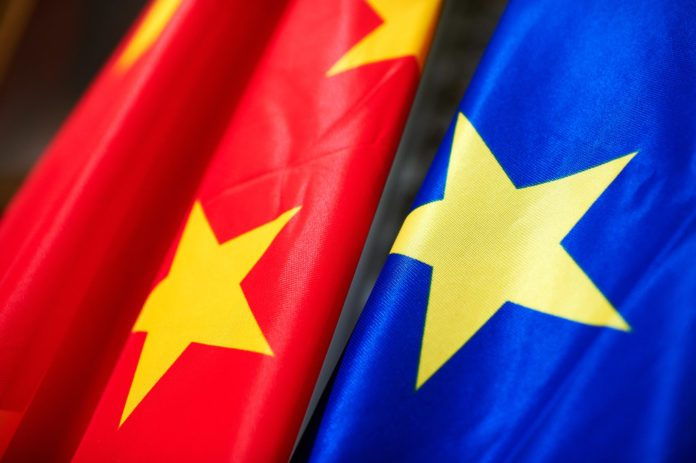2021 has been a rocky year for EU-China relations. Almost one year after Brussels and Beijing agreed in principle the Compressive Agreement on Investment (CAI), the deal remains on the backburner as political tensions over matters such as Xinjiang, Hong Kong, or Taiwan persist. However, re-engagement with China is back on the agenda of key players in Brussels.
If one goes back 11 months in time, there was a sense of reinvigoration in European Union-China relations, as on the last day of 2020 both sides agreed in principle to move ahead with the milestone Comprehensive Agreement on Investment (CAI). It was mostly thanks to the commitment and efforts of key players, namely German Chancellor Angela Merkel who held the chair of the European Council in the second half of 2020.
However, optimism on Sino-European relations proved to be short-lived. As CAI was starting to be reviewed by the European Parliament, a storm hit EU-China relations in March resulting from the sanctions first imposed by Brussels, when the EU
joined the US, Canada and the UK in imposing sanctions against Chinese officials involved in alleged human rights violations in Xinjiang, allegations that have always been clearly denied by Beijing. Then China placed sanctions on MEPs, think tanks and members of the EP’s Subcommittee on Human Rights and its Political and Security Committee. Some European scholars and experts involved in EU-China dialogue platforms are worried about the impact of the sanctions on the wider Sino-European linkages.
Tackling the conundrum
Since autumn, “the buzzword on China in Brussels is re-engagement on the basis that after the sanctions the direct relationship between Brussels and Beijing has been disrupted”, said Grzegorz Stec, analyst and expert on EU-China relations from the Germany-based think tank Mercator Institute for China Studies (MERICS).
Still, this idea is yet to be translated into something truly concrete. “I think it’s more an expression that has been used increasingly by a number of actors on the European side for different purposes”, Mr Stec noted.

The revision of the EU’s strategic policy paper towards China seems to be on the backburner. It was reported earlier this year that Brussels would move ahead with a review of the key blueprint by the fourth quarter. However, a European Union spokesperson told Macau News Agency that the “EU’s multi-faceted approach towards China – as set out in the ‘Strategic Outlook’ Joint Communication of 2019, and reaffirmed by the European Council in October 2020 – remains valid”, adding that “there is no review foreseen at this stage”.
Grzegorz Stec considers that “the final outcome of this assessment on EU-China relations is basically that the guiding principles of the EU-China Strategic Outlook remain in place. But what is needed is to double-down on developing tools for handling the aspects of the relation with China that the EU disagrees with. It’s more about the fact that the EU needs to act together and have more tools on the EU-level than re-envisioning the multifaceted approach that the EU has been pursuing.”
“I think that much of the European’s side approach will remain focused on trying to keep actions on China depoliticized as much as possible. To try to present it as technical rather than as political”, Mr Stec added.
A recent example of this approach could be seen in the recently unveiled EU Anti-Coercion Instrument, described by the European Commission as a tool to “empower the Commission to apply trade, investment or other restrictions towards any non-EU country unduly interfering in the policy choices of the EU or its Member States”. Brussels states that “ deterrence is its primary function, therefore the instrument would be most successful if there is no need to use it”.
Even though no specific country is mentioned, the initiative comes after the recent row between Lithuania and China, where Beijing was accused of blocking at one time Lithuanian exports as Vilnius expanded links with Taiwan.
CAI still frozen
Against this backdrop, the prospects of bringing CAI back to the table seem slim at this stage. In early November, European Council President Charles Michel delivered a speech at the Konrad-Adenauer-Stiftung State of Europe event made the case for CAI, stressing that despite not being perfect, “it would open access to major sectors from which our European companies are currently barred” and “would create more reciprocity and address labor laws and conditions”.

Nevertheless, with regard to CAI, Mr Stec notes that “it is hard one to envision a way for the current situation to change. The statement by Michel doesn’t change a lot in terms of substance”. The MERICS expert believes that it “was more intended as a gesture of goodwill towards the Chinese side to create the right setting for discussions about the next EU-China Summit”.
During their call on 15 October, Charles Michel and Chinese President Xi Jinping agreed to aim to hold the next EU-China Summit in the near future. It was reported that Michel and other EU key actors were hopeful on a Summit to be held before the end of the year, but no development has been announced in that respect.
Asked about the status of CAI within the EU institutions, a EU spokesperson told MNA that “the Chinese retaliatory sanctions targeting members of the European Parliament and an entire parliamentary sub-committee are regrettable and do not create for the moment the favourable environment needed”. On the other hand, the spokesperson said that they “continue to think that the CAI would bring positive elements to Europe and European companies: in terms of market access, in terms of better level playing field and also in terms of sustainability commitments.”




















